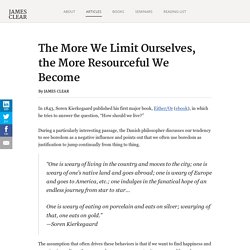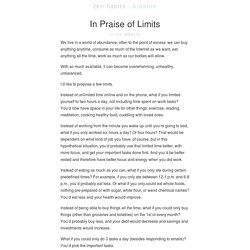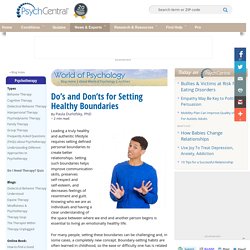

6 Vital Facts About Boundaries. I explore the topic of boundaries in my writing a lot.

I do this because boundaries form the basis of healthy relationships with both others and ourselves. Boundaries are essential. They’re more than barriers and fences that we put up. They speak to something greater (which you’ll learn more about below). According to psychologist Katayune Kaeni, PsyD, boundaries are: “knowing your own limits, needs and desires in order to maintain your sense of self and express that to another person, so you can teach them how to treat you.”
Psychologist Sherry Walling, Ph.D, defines boundaries as: “a space between one’s self and that which is separate from the self… At every level of our existence, we form some kind of boundary to define what is us and what is separate from us.” Below Kaeni and Walling shared six key facts about boundaries, along with suggestions for creating and maintaining your own boundaries.
Boundaries change dramatically depending on time and context. Boundaries are about safety. The More We Limit Ourselves, the More Resourceful We Become. In 1843, Soren Kierkegaard published his first major book, Either/Or (ebook), in which he tries to answer the question, “How should we live?”

During a particularly interesting passage, the Danish philosopher discusses our tendency to see boredom as a negative influence and points out that we often use boredom as justification to jump continually from thing to thing. “One is weary of living in the country and moves to the city; one is weary of one’s native land and goes abroad; one is weary of Europe and goes to America, etc.; one indulges in the fanatical hope of an endless journey from star to star…One is weary of eating on porcelain and eats on silver; wearying of that, one eats on gold.” —Soren Kierkegaard The assumption that often drives these behaviors is that if we want to find happiness and meaning in our lives, then we need more: more opportunity, more wealth, and more things.
We start to believe that moving somewhere new will remove the messiness of life. The Power of Limitations. In Praise of Limits. By Leo Babauta We live in a world of abundance, often to the point of excess: we can buy anything anytime, consume as much of the Internet as we want, eat anything all the time, work as much as our bodies will allow.

With so much available, it can become overwhelming, unhealthy, unbalanced. I’d like to propose a few limits. Instead of unlimited time online and on the phone, what if you limited yourself to two hours a day, not including time spent on work tasks? You’d now have space in your life for other things: exercise, reading, meditation, cooking healthy food, cuddling with loved ones. Instead of working from the minute you wake up until you’re going to bed, what if you only worked six hours a day? Instead of eating as much as you can, what if you only ate during certain predefined times? Instead of being able to buy things all the time, what if you could only buy things (other than groceries and toiletries) on the 1st of every month? Weaknesses.
Asserted Behavior. Fear Zone. Letting go. 4 Ways to Set and Keep Your Personal Boundaries. Do’s and Don’ts for Setting Healthy Boundaries. Leading a truly healthy and authentic lifestyle requires setting defined personal boundaries to create better relationships.

Setting such boundaries helps improve communication skills, preserves self-respect and self-esteem, and decreases feelings of resentment and guilt. Knowing who we are as individuals and having a clear understanding of the space between where we end and another person begins is essential to living an emotionally healthy life. For many people, setting these boundaries can be challenging and, in some cases, a completely new concept. Boundary-setting habits are often learned in childhood, so the ease or difficulty one has is related to how he was raised. For those raised in an environment where respectful, consistent, and age-appropriate boundaries were the norm, it will be easier to define and set these guidelines. Inconsistent or absent boundaries can lead to issues with low self-respect and self-esteem. Do: Give yourself permission to set boundaries.